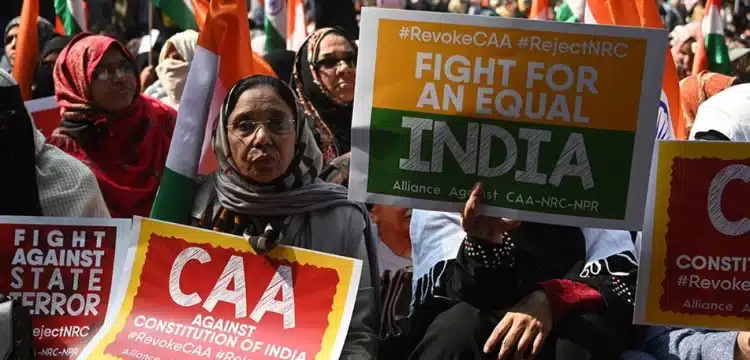[vc_row][vc_column][vc_column_text dp_text_size=”size-4″]In a recent controversial move, the Indian government has declared the implementation of the highly debated Citizenship Act, a decision that has drawn criticism for excluding Muslims from its benefits. This announcement, made just weeks before the General Elections, has sparked condemnation from rights activists directed at Prime Minister Narendra Modi.
The government’s decision focuses on enforcing the rules associated with the Citizenship Amendment Act (CAA), a contentious law passed by Modi’s government in 2019. The CAA grants Indian citizenship to non-Muslim refugees from neighboring countries, specifically Hindus, Parsis, Sikhs, Buddhists, Jains, and Christians who fled predominantly Muslim Afghanistan, Bangladesh, and Pakistan before December 31, 2014 – a criterion perceived as discriminatory against Muslims.
Read more: Senior Indian Election Official Resigns Before Upcoming Polls
Drafting the rules for the law faced delays due to widespread protests that erupted following its passage in December 2019, resulting in casualties and injuries. A government spokesperson emphasized that the CAA was a crucial component of the BJP’s 2019 manifesto, aiming to provide citizenship to the persecuted.
The Home Ministry spokesperson explained that the regulations would enable eligible individuals under the 2019 Citizenship Amendment Act to apply for Indian citizenship, with an online application process through a designated web portal.
As the rules come into effect, Muslim groups express concerns that, when combined with a proposed National Register of Citizens (NRC), the law could marginalize India’s 200 million Muslims, the world’s third-largest Muslim population, particularly fearing potential citizenship revocation for Muslims lacking documentation in border states.
While the government asserts that the law is designed to grant citizenship rather than revoke it, critics, including rights groups, Muslims, and members of the Congress, argue that the law introduces religion as a criterion for citizenship, contrary to the principles of the Constitution. Shashi Tharoor, a Congress leader, contends that linking citizenship to specific religions is a divisive and damaging communal exercise in India’s history.[/vc_column_text][/vc_column][/vc_row]











